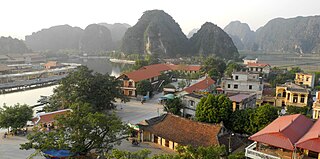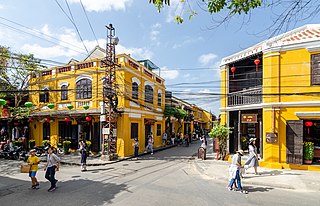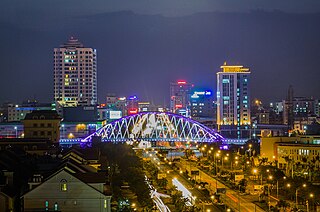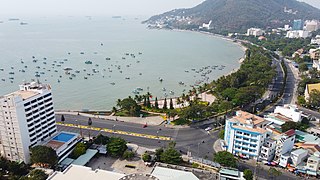Vietnam, a vibrant and diverse destination, offers a captivating blend of natural beauty, rich history, and vibrant culture. From the stunning landscapes of Ha Long Bay and the lush rice terraces of Sapa, to the ancient wonders of Hoi An and the bustling streets of Ho Chi Minh City, Vietnam has something to enchant every traveler.
Immerse yourself in the vibrant street food scene and sample the delicious flavors of pho, banh mi, and fresh spring rolls.
Discover the unique charm and beauty of the ancient town of Hoi An, with its preserved architecture and lantern-lit streets.
How to best experience Vietnam?
Search for Tickets, tours, and activities in Vietnam using direct search on the following providers:
GetYourGuide.com Viator.com Trip.com Expedia.com Tiqets.com Ctrip.com (中文)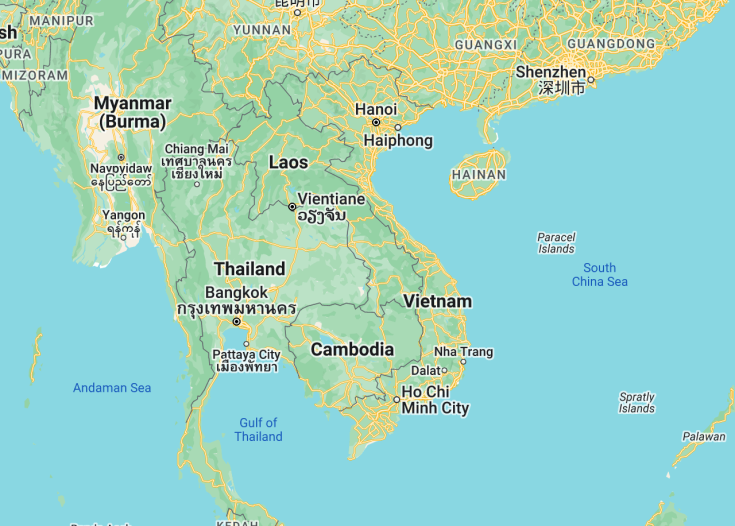
Top cities to visit in Vietnam
Discover the best cities of Vietnam and best places to visit.
Vietnam: the land of the ascending Dragon
| Capital | Hanoi |
| Time in Vietnam | GMT+7 |
| Language spoken | Vietnamese |
| Population | 98 million (source: World Bank, 2021) |
| Religion | Buddhism (50%) Catholicism (7%) Caodaism (1.5%) Protestantism (0.5%) Others and non-religious (41%) |
| Currency | Vietnamese đồng (₫, VND) |
| Airports | Tân Sơn Nhất International Airport (Ho Chi Minh City) Nội Bài International Airport (Hanoi) Đà Nẵng International Airport (Đà Nẵng) |
Vietnam, a Southeast Asian country known for its stunning natural landscapes and rich history, is a must-visit destination for travelers seeking a unique cultural experience. With its vibrant cities, picturesque countryside, and pristine coastlines, Vietnam offers a diverse range of attractions for every type of traveler.
Where is Vietnam located?
Vietnam is located in Southeast Asia, sharing borders with China to the north, Laos and Cambodia to the west, and the South China Sea to the east. It stretches over 1,000 miles from north to south, offering a varied geography encompassing lush mountains, fertile deltas, and stunning beaches.
What is Vietnam famous for?
Vietnam is famous for its fascinating history, delicious cuisine, and breathtaking natural beauty. The country is renowned for its UNESCO World Heritage Sites like Ha Long Bay, a stunning bay dotted with limestone islands, and Hoi An, an ancient trading port with well-preserved historical architecture. Vietnam is also known for its vibrant street food culture, where visitors can indulge in pho, banh mi, and fresh seafood.
History
Vietnam has a long and rich history that dates back thousands of years. The history of Vietnam can be traced back to the ancient kingdom of Van Lang, which was established in 2879 BC. Over the centuries, Vietnam has experienced numerous dynasties, invasions, and periods of colonization that have shaped its unique cultural and historical landscape.
(938 AD-1802 AD) The Vietnamese Dynasties
During this period, Vietnam was ruled by a series of dynasties, including the Ly, Tran, Le, and Nguyen dynasties. These dynasties brought stability and prosperity to the region, promoting advancements in art, literature, and trade. Vietnam also experienced periods of conflict, particularly with the Mongols and the Chinese, but managed to maintain its independence.
(1858 AD-1954 AD) French Colonialism
In the 19th century, Vietnam fell under French colonial rule. The French established Indochina as a French protectorate, exploiting the country’s resources and implementing Western governance systems. This period led to widespread resistance among the Vietnamese people, culminating in the famous Vietnamese independence movement led by Ho Chi Minh.
(1954 AD-Present) The Vietnam War and Reunification
The Vietnam War, also known as the Second Indochina War, was a major conflict that lasted from 1955 to 1975. It was fought between the communist forces of North Vietnam, supported by the Soviet Union and China, and the non-communist forces of South Vietnam, supported by the United States and its allies. The war resulted in significant loss of life and destruction and had a profound impact on the political landscape of Vietnam.
In 1975, the communist forces achieved victory and reunited the country under the Socialist Republic of Vietnam. Since then, Vietnam has undergone a process of economic and social transformation. The country has embraced market-oriented reforms while preserving its socialist political system. Today, Vietnam is a rapidly growing economy and a popular tourist destination.
Visit Vietnam
What to see and do in Vietnam
When visiting Vietnam, there are plenty of attractions and activities to explore. Here are some of the must-see and must-do experiences:
- Explore the ancient city of Hanoi and visit the Ho Chi Minh Mausoleum.
- Cruise along the breathtaking Halong Bay, known for its limestone karsts and emerald waters.
- Discover the historic city of Hue, with its Imperial Citadel and ancient temples.
- Immerse yourself in the vibrant atmosphere of Ho Chi Minh City, formerly known as Saigon, and visit the War Remnants Museum.
- Experience the tranquility of the Mekong Delta and take a boat trip along the canals.
- Visit the ancient town of Hoi An, known for its well-preserved architecture and colorful lanterns.
- Explore the Cu Chi Tunnels, a network of underground tunnels used during the Vietnam War.
Upcoming events in Vietnam
Vietnam hosts a variety of events and festivals throughout the year, offering visitors a chance to experience the country’s vibrant culture and traditions. Some notable events in Vietnam include:
- Tet Nguyen Dan (Lunar New Year) – Celebrated in late January or early February, Tet is the most important and widely celebrated festival in Vietnam. It marks the arrival of spring and is a time for family reunions, feasting, and traditional performances.
- Mid-Autumn Festival – Celebrated in September or October, the Mid-Autumn Festival is a time to appreciate the harvest and is particularly joyous for children. Lantern processions, mooncakes, and dragon dance performances are common during this festival.
- Hoi An Lantern Festival – Taking place on the 14th day of each lunar month in the ancient town of Hoi An, this festival sees the town lit up with colorful lanterns. Visitors can enjoy traditional music and dance performances as well as release floating lanterns on the river.
- Da Lat Flower Festival – Held biennially in Da Lat, this festival showcases the city’s abundance of flowers and is a celebration of spring. Visitors can enjoy flower exhibitions, parades, and cultural performances.
Best time to visit Vietnam
The best time to visit Vietnam depends on the specific regions and activities you plan to engage in. Generally, the most popular time to visit is during the spring (from February to April) when the weather is mild and pleasant. The autumn season (from August to October) also offers pleasant weather and fewer tourists.
However, it’s important to note that Vietnam has diverse climates due to its elongated shape, with variations between the north and south. The south generally experiences a tropical climate with high temperatures and high humidity year-round. The north has four distinct seasons, with cooler temperatures during the winter months.
For beach lovers, the central coast of Vietnam offers the best weather from May to September, with plenty of sunshine and warm temperatures. The north is best visited from October to December, when the weather is cooler and pleasant for outdoor activities.
Is Vietnam worth visiting?
Vietnam is definitely worth visiting for its rich history, stunning natural landscapes, and vibrant culture. From the bustling cities of Hanoi and Ho Chi Minh City to the serene beauty of Halong Bay and the Mekong Delta, there is something for every traveler in Vietnam.
Visitors can explore ancient temples, sample delicious Vietnamese cuisine, and experience the warmth and hospitality of the Vietnamese people. The country’s history, including the Vietnam War, provides a unique insight into the resilience and spirit of the Vietnamese people.
However, it’s important to note that Vietnam can be quite busy and crowded, especially in popular tourist destinations. Some areas may also have issues with pollution or traffic. It’s always advisable to plan your trip carefully and be prepared for any challenges that may arise.
If you are seeking a unique and culturally diverse destination, Vietnam is definitely worth considering. Its stunning landscapes, rich history, and warm hospitality make it an unforgettable experience.
Common questions
What are the top tourist attractions in Vietnam?
What is the weather like in Vietnam?
What is the best time to visit Vietnam?
What should I pack for a trip to Vietnam?
- Light and breathable clothing
- Adequate sun protection (hat, sunglasses, sunscreen)
- Insect repellent
- Comfortable walking shoes
- Swimwear (if you plan to visit beach destinations)
- A lightweight rain jacket or poncho (especially during the rainy season)
- Adapter for electrical outlets
- Basic medical kit
- Currency (Vietnamese Dong) or a reliable payment method
Remember to pack according to the specific season and region you plan to visit.
What is the local currency in Vietnam?
What are the famous dishes in Vietnam?
- Pho: A popular Vietnamese noodle soup
- Banh mi: A delicious Vietnamese sandwich
- Goi cuon: Fresh spring rolls made with rice paper
- Bun cha: Grilled pork with noodles and herbs
- Com tam: Broken rice served with grilled pork or other meats
- Banh xeo: Vietnamese savory pancake
- Ca phe sua da: Vietnamese iced coffee
These are just a few examples, and there is so much more to explore in Vietnamese cuisine!
What is the transportation system like in Vietnam?
- Domestic flights: There are several airlines operating domestic flights connecting major cities and popular tourist destinations.
- Trains: Vietnam has a railway network that connects major cities, making train travel a convenient option.
- Buses: Buses are widely available and offer routes to different destinations within Vietnam.
- Taxis/ride-hailing services: Taxis and ride-hailing services like Grab are available in urban areas.
- Motorbikes: Renting a motorbike is a popular choice for exploring cities and rural areas. However, make sure to prioritize safety and wear appropriate gear.
Each mode of transportation has its advantages depending on your preferences and travel plans.
What are some cultural customs and etiquette in Vietnam?
- Greetings: It is customary to greet people with a smile and a slight bow. Handshakes are also common, especially in more formal settings.
- Respecting elders: Vietnamese culture places a strong emphasis on respecting elders. Use appropriate titles when addressing older individuals.
- Removing shoes: It is customary to remove your shoes before entering someone’s home, temples, and certain establishments. Look for cues or signs indicating whether shoes should be taken off.
- Dress modestly: When visiting religious sites or rural areas, dress modestly and appropriately. Avoid wearing revealing clothing.
- Respecting local customs: Familiarize yourself with local customs and traditions, such as specific gestures, table manners, and practices during special occasions.
By showing respect for Vietnamese customs, you’ll have a more immersive and positive experience in the country.
What are some popular souvenirs to buy in Vietnam?
- Silk products: Vietnam is known for its quality silk. Silk scarves, clothing, or accessories make for elegant souvenirs.
- Lacquerware: Vietnamese lacquerware items, such as bowls, plates, and vases, are beautifully crafted and make for stylish additions to any home.
- Handicrafts: Traditional handicrafts like embroidered textiles, pottery, wooden carvings, and bamboo products are popular choices.
- Coffee and tea: Vietnam is famous for its coffee and tea production. Look for locally produced coffee beans, filters, or fragrant tea leaves to bring home.
- Conical hats (non la): The iconic Vietnamese conical hat is a symbol of Vietnamese culture and makes for a unique souvenir or decorative item.
These are just a few examples, and each region in Vietnam may offer its own distinct souvenirs.
What are the visa requirements for visiting Vietnam?
- Visa exemption: Some nationalities are eligible for visa exemption and can stay in Vietnam for a certain period without a visa. Check with the Vietnamese embassy or consulate in your country for the latest information.
- Visa on arrival: If you are flying into Vietnam, you can apply for a visa on arrival. This requires obtaining an approval letter in advance and getting your visa stamped at the airport upon arrival.
- E-visa: Vietnam also offers e-visas, which can be applied for online and allow for entry through specified airports, land crossings, or seaports. Check the official Vietnamese immigration website for details.
- Tourist visa: If you plan to stay in Vietnam for an extended period, you may need to apply for a tourist visa in advance through the Vietnamese embassy or consulate in your home country.
It’s important to check the latest visa requirements and apply well in advance of your planned visit to Vietnam.
What are some popular beach destinations in Vietnam?
- Nha Trang: Known for its beautiful beaches and vibrant nightlife, Nha Trang offers a range of water activities and luxurious resorts.
- Phu Quoc Island: Located in the Gulf of Thailand, Phu Quoc Island is renowned for its pristine beaches, clear waters, and vibrant coral reefs.
- Mui Ne: A coastal town famous for its unique sand dunes, windsurfing, and kiteboarding.
- Da Nang: Known for its long sandy beaches, Da Nang offers a dynamic mix of modern beach resorts and historical attractions.
- Mui Ne: A coastal town famous for its unique sand dunes, windsurfing, and kiteboarding.
- Hoi An: While not directly on the coast, the ancient town of Hoi An is close to beautiful beaches, such as An Bang Beach and Cua Dai Beach.
These are just a few examples, and there are more stunning beach destinations to explore in Vietnam.
Are there any health risks or vaccinations required for visiting Vietnam?
- Vaccinations: Commonly recommended vaccinations for travel to Vietnam include Hepatitis A and B, typhoid, tetanus, diphtheria, and measles-mumps-rubella (MMR). The need for specific vaccinations may vary depending on factors such as the duration of your stay, planned activities, and your vaccination history.
- Malaria: Malaria prophylaxis may be required if you are planning to visit certain rural or remote areas in Vietnam. Consult with a healthcare professional to assess the need for malaria prevention medication.
- Mosquito-borne illnesses: Dengue fever and Zika virus are present in Vietnam. Take precautions to avoid mosquito bites, such as using insect repellent with DEET, wearing long sleeves and pants, and staying in accommodations with mosquito nets or air conditioning.
- Food and water safety: To prevent foodborne illnesses, it is advisable to drink bottled water, avoid street food with questionable hygiene practices, and opt for cooked and hot meals from reputable establishments.
Health risks can vary, so it’s important to stay informed and take appropriate preventive measures.



